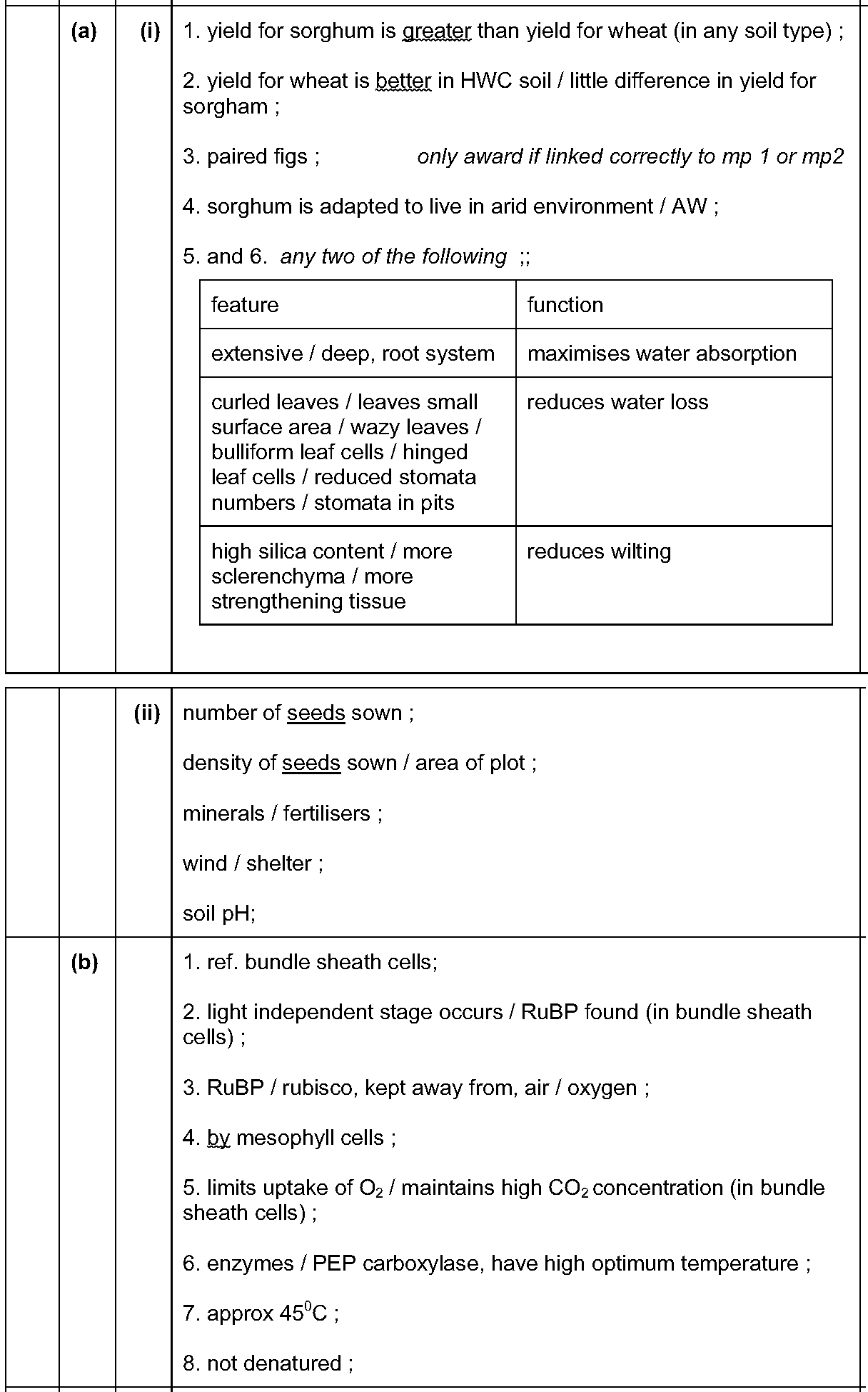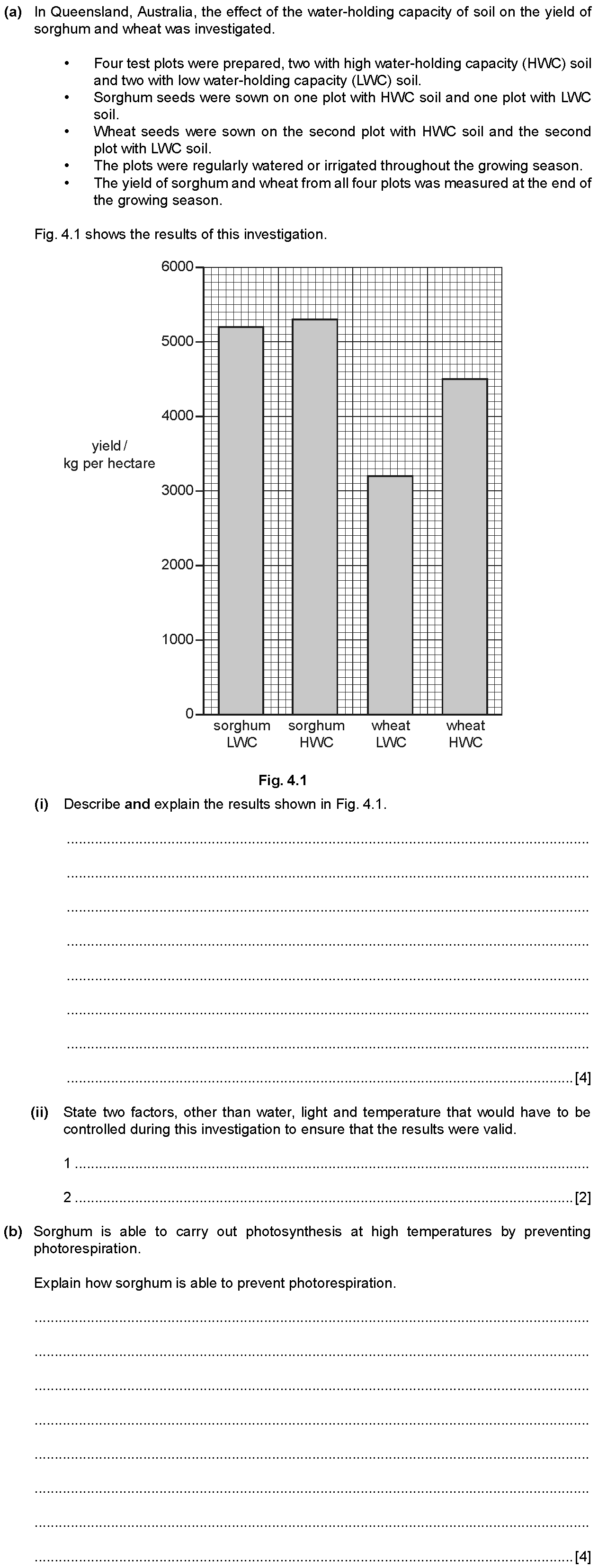
Q4:
AS & A Level Biology - 9700 Paper 4 2009 Winter Zone 2
Questions:
4/10

Topic: CH13 - PHOTOSYNTHESIS
Solution



PRACTISE
Similar Questions

LEARN
Concepts with Sparky

More Questions from this Topic
Theory
CH13 - PHOTOSYNTHESIS
The leaves of Mimosa pudica plants are made of a number of structures known as pinnae. The pinnae fold when the leaf is touched. This closes the leaf....
2024
 Winter
Winter
 Winter
Winter
 3
3
Theory
CH13 - PHOTOSYNTHESIS
Stomata in leaves respond to changes in environmental conditions by opening and closing. This regulates carbon dioxide uptake and water loss.
(a) Des...
2024
 Summer
Summer
 Summer
Summer
 4
4
Theory
CH13 - PHOTOSYNTHESIS
Photosynthesis is the energy transfer process that occurs in chloroplasts.
Fig. 5.1 shows some biochemical events that occur in a chloroplast during ...
2024
 Summer
Summer
 Summer
Summer
 6
6
Theory
CH13 - PHOTOSYNTHESIS
(a) Paper chromatography is a technique that can be used to separate and identify different chloroplast pigments.
Describe how the results of paper c...
2024
 Winter
Winter
 Winter
Winter
 5
5
Theory
CH13 - PHOTOSYNTHESIS
(a) In plants, stomata open and close in response to changes in environmental conditions. Explain why stomata need to open and close according to envi...
2024
 Summer
Summer
 Summer
Summer
 4
4
Theory
CH13 - PHOTOSYNTHESIS
(a) Experiments were carried out to determine the effect of light intensity on the rate of photosynthesis of a species of the unicellular prototist, C...
2024
 Summer
Summer
 Summer
Summer
 3
3
Theory
CH13 - PHOTOSYNTHESIS
The leaves of Mimosa pudica plants are made of a number of structures known as pinnae. The pinnae fold when the leaf is touched. This closes the leaf....
2024
 Winter
Winter
 Winter
Winter
 1
1
Theory
CH13 - PHOTOSYNTHESIS
shows a transmission electron micrograph of part of a chloroplast.
(a) Tdescribes some functions that occur in different parts of a chloroplast.
C...
2023
 Summer
Summer
 Summer
Summer
 6
6
Theory
CH13 - PHOTOSYNTHESIS
Oryza is a genus of grass plants that includes the rice, Oryza sativa, a food crop.
(a) Farmers flood fields of rice because this encourages faster g...
2023
 Summer
Summer
 Summer
Summer
 3
3
Theory
CH13 - PHOTOSYNTHESIS
Chloroplasts carry out photosynthesis.
Fig. 1.1 shows some structural features of a chloroplast and some processes that occur within it.
...
2023
 Winter
Winter
 Winter
Winter
 5
5
More Questions from year 2009
Theory
CH1 - CELL STRUCTURE
Fig. 1.1 shows the outline of a ciliated cell from the human gas exchange system.(a) (i) Inside the ciliated cell in Fig. 1.1, draw the nuclear envelo...
2009
 Summer
Summer
 Summer
Summer
 6
6
Theory
CH18 - BIODIVERSITY, CLASSIFICATION AND CONSERVATION
(a) The table below gives some terms that are used in ecology and their definitions. Complete the table.termdefinitionecosystemall the organisms and t...
2009
 Summer
Summer
 Summer
Summer
 2
2
Theory
CH4 - CELL MEMBRANES AND TRANSPORT
(a) With reference to Fig. 3.1 and the information above, explain how flatworms survive without a transport system for respiratory gases. ...............
2009
 Summer
Summer
 Summer
Summer
 2
2
Theory
Mechanism of Enzyme Action
(a) With reference to Fig. 4.1,
(i) name
process A
molecule B
structure C
sequence of bases D
(ii) state two ways ...
2009
 Summer
Summer
 Summer
Summer
 3
3
Theory
CH7 - TRANSPORT IN PLANTS
Fig. 5.1 shows part of a transverse section of a leaf.
(a) Explain, in terms of water potential, how water moves from Q to R. [4]
(b)...
2009
 Summer
Summer
 Summer
Summer
 3
3
Theory
CH5 - THE MITOTIC CELL CYCLE
(a) Fig. 6.1 is an electron micrograph of a cancer cell in the process of dividing by mitosis. The stage of mitosis visible in Fig. 6.1 is metaphase.S...
2009
 Summer
Summer
 Summer
Summer
 4
4
Theory
CH1 - CELL STRUCTURE
Yeast cells contain enzymes, which catalyse the breakdown of glucose to produce ethanol and carbon dioxide. These products change the environment of t...
2009
 Summer
Summer
 Summer
Summer
 2
2
Theory
CH1 - CELL STRUCTURE
J1 is a slide of a stained transverse section of a plant organ.(a) Draw a large, low power, plan diagram of a quarter of the specimen as shown in Fig....
2009
 Summer
Summer
 Summer
Summer
 1
1
Theory
CH1 - CELL STRUCTURE
(a) (i) Using the information in Table 1.1, decide which other concentrations to make and complete Table 1.2 including the concentrations from Table 1...
2009
 Summer
Summer
 Summer
Summer
 2
2
Theory
CH1 - CELL STRUCTURE
K1 is a slide of a stained transverse section of a plant organ.(a) (i) Draw a large, low power plan diagram of one end of the specimen on K1 as shown ...
2009
 Summer
Summer
 Summer
Summer
 3
3




 Share
Share




 Previous
Previous




